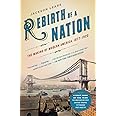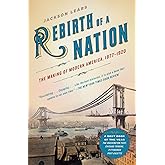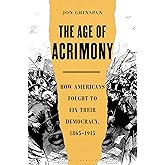Buy new:
-22% $17.97$17.97
$3.99 delivery January 31 - February 7
Ships from: allnewbooks Sold by: allnewbooks
Save with Used - Good
$12.54$12.54
Ships from: Amazon Sold by: eCampus_

Download the free Kindle app and start reading Kindle books instantly on your smartphone, tablet, or computer - no Kindle device required.
Read instantly on your browser with Kindle for Web.
Using your mobile phone camera - scan the code below and download the Kindle app.



 Audible sample
Audible sample Follow the author
OK
A Fierce Discontent: The Rise and Fall of the Progressive Movement in America, 1870-1920
Purchase options and add-ons
The progressives redefined the role of women, rewrote the rules of politics, banned the sale of alcohol, revolutionized marriage, and eventually whipped the nation into a frenzy for joining World War I. These colorful, ambitious battles changed the face of American culture and politics and established the modern liberal pledge to use government power in the name of broad social good. But the progressives, unable to deliver on all of their promises, soon discovered that Americans retained a powerful commitment to individual freedom. Ironically, the progressive movement helped reestablish the power of conservatism and ensured that America would never be wholly liberal or conservative for generations to come.
Michael McGerr's A Fierce Discontent recreates a time of unprecedented turbulence and unending fascination, showing the first American middle-class revolution. Far bolder than the New Deal of FDR or the New Frontier of JFK, the Progressive Era was a time when everything was up for grabs and perfection beckoned.
- ISBN-100195183657
- ISBN-13978-0195183658
- PublisherOxford University Press
- Publication dateJuly 7, 2005
- LanguageEnglish
- Dimensions6.14 x 1.06 x 9.22 inches
- Print length395 pages
Discover the latest buzz-worthy books, from mysteries and romance to humor and nonfiction. Explore more
Frequently bought together
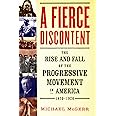
Customers who viewed this item also viewed
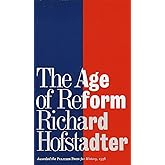 The Age of ReformMass Market Paperback
The Age of ReformMass Market Paperback
Editorial Reviews
Review
Book Description
About the Author
Excerpt. © Reprinted by permission. All rights reserved.
A Fierce Discontent
The Rise and Fall of the Progressive Movement in America, 1870-1920By Michael McGerrOxford University Press, USA
Copyright © 2005 Michael McGerrAll right reserved.
ISBN: 9780195183658
Preface
We live in a politically disappointing time. No matter what our politics, the start of the twenty-first century is not what we hoped it would be. For liberals, the "American Century" - the liberal century - was the last one; and it ended early, in the 1960s and 1970s, with racial backlash, stagflation, and Vietnam. For conservatives, the "Reagan Revolution" of the 1980s ended pretty quickly, too; enough big government and economic uncertainty remain in the aftermath to make Americans wonder whether there was a revolution at all. For the handful of American radicals, the promise of the "Movement" of the 1960s is long gone: corporate America still stands powerful and the American "empire" looms larger than ever around the world. Despite sex scandals, financial scandals, and the worst terrorist attack in the nation's history, politics and government fail to engage the sustained interest of most Americans.It is no wonder, then, that the Progressive Era remains so fascinating. The people and struggles of that age of "fierce discontent" a century ago still command our attention. There is Theodore Roosevelt himself, the energy glinting through his pince-nez, as he urges Americans to use the "movement of agitation throughout the country ... to punish the authors of evil...." There are the women suffragists marching in the streets to demand the vote. There are the determined anthracite coal miners of Pennsylvania quietly walking out en masse to demand recognition from their wealthy bosses. There is the crafty steel magnate Andrew Carnegie urging the families of the upper-class "plutocracy" to save themselves by giving their money to philanthropic causes. There is the calm courage of Jane Addams, crossing the social boundaries of urban Chicago to improve and change the lives of her new immigrant neighbors. There is the moral outrage of Carry Nation, smashing saloons to end the scourge of drink. These people provoke nostalgia and even jealousy; in one way or another, all of them felt the "fierce discontent" that Theodore Roosevelt described; all of them believed that progress was possible for their country.
The Progressive Era is more than a matter of nostalgia. It is the argument of this book that progressivism created much of our contemporary political predicament. The epic of reform at the dawn of the twentieth century helps explain the less-than-epic politics at the dawn of the twenty-first. Progressivism, the creed of a crusading middle class, offered the promise of utopianism - andgenerated the inevitable letdown of urealistic expectations.
Those expectations were indeed remarkable. The progressives developed a stunningly broad agenda that ranged well beyond the control of big business, the amelioration of poverty, and the purification of politics to embrace the transformation of gender relations, the regeneration of the home, the disciplining of leisure and pleasure, and the establishment of segregation. Progressives wanted not only to use the state to regulate the economy; strikingly, they intended nothing less than to transform other Americans, to remake the nation's feuding, polyglot population in their own middle-class image.
This startling agenda had commonplace origins; it was rooted in the day-to-day lives of middle-class men and women in the Gilded Age of the late nineteenth century. Progressivism was the way in which these Victorian men and women came to answer the basic questions of human life that have confronted all people in all times and places: What is the nature of the individual? What is the relationship between the individual and society? What are the proper roles of men, women, and the family? What is the place of work and pleasure in human life? These are ordinary questions, but the middle class had to answer them at an extraordinary time. The Victorians lived in an industrializing society that generated dismaying extremes of wealth and poverty, tempting new pleasures, alien cultures, and frightening antagonisms. Threatened by these external developments, the Victorians lived with a private crisis of their own - the breakdown of the relationship between middle-class men and women. The result of these simultaneous public and private crises was a gradual but dramatic transformation: over the two generations from the end of the Civil War to the 1890s, the Victorians became progressives, with new views of the individual, society, gender, and pleasure. To make the world safe for themselves and their children, the progressive middle class sallied forth to reform the nation. In the face of spirited opposition from other groups, the progressives intended to build what William James sneeringly but accurately labeled the "middle-class paradise."
I believe progressivism was a radical movement, though not by the common measures of economic and political radicalism. More influenced by socialism than they liked to admit, progressives nevertheless shied away from a fundamental restructuring of the capitalist economy. They generally declined numerous opportunities to rethink the virtue of private property. Instead, progressives were radical in their conviction that other social classes must be transformed and in their boldness in going about the business of that transformation. As they themselves had been changed, so others should be changed, too. The sweep of progressivism was remarkable, but because the progressive agenda was so often carried out in settlement houses, churches, and schoolrooms, in rather unassuming day-to-day activities, the essential audacity of the enterprise can be missed. Progressivism demanded a social transformation that remains at once profoundly impressive and profoundly disturbing a century later.
Approaching progressivism in this way, I have shifted the balance of the conventional narrative. The center of this book looks at four quintessential progressive battles: to change other people; to end class conflict; to control big business; and to segregate society. While I treat well-known laws and political events, this is also a book about less well-known, extrapolitical efforts to transform America and Americans, such as the antidivorce movement and the rise of Chautauqua. While I focus extensively on public life, this is very much a book about private, intimate life as well. Given its focus on the basic values of social groups, it is a book about parents and their children - John and Sarah Addams and their daughter Jane; the Russian immigrant tailor Golub and his rebellious daughter Rahel; the farming couple Richard and Belle Garland and their equally rebellious son Hamlin. It is in the relationships of these generations that we can most clearly see how the stresses of industrializing America fractured old ideologies and created new ones, including progressivism.
From its private and intimate origins, the progressive movement ultimately played out on a very public stage. Progressivism was an explosion, a burst of energy that fired in many directions across America. From the 1890s to the 1910s, the progressives managed to accomplish much of their ambitious agenda. World War I marked the high point of the progressive movement. As American soldiers fought overseas to make the world safe for democracy, the administration of Woodrow Wilson worked feverishly to create a wartime model for a peacetime progressive utopia. Against the backdrop of wartime struggle and sacrifice, reformers managed to outlaw alcohol, close down vice districts, win suffrage for women, expand the income tax, and take over the railroads. But the progressives had overreached. Winning the war abroad, the Wilsonians lost their war at home. The administration's war policies produced disorder instead of order, chaos instead of control. Amid race riots, strikes, high inflation, and a frenzied Red scare, Americans turned against the progressive blueprint for the nation. The climax of progressivism, World War I was also its death knell.
It is this story, this remarkable rise and cataclysmic collapse, that set the stage for the political life we now know so well. Americans' ambivalent attitudes toward politics and the state, our skepticism about reform, our fear of government's power, and our arm's-length relationship with political leaders have their roots before the ages of Franklin Roosevelt, Lyndon Johnson, and Ronald Reagan, in the few dramatic decades at the turn of the previous century. The New Deal, World War II, the Cold War, the Great Society, and now the war on terrorism have each entailed ambitious plans for America; and each has had dramatic impacts on policy and society. But the failure of the progressive movement set boundaries around the aspirations of all these efforts. None of them was as ambitious, as openly determined to transform people and create utopia, as the progressive movement. We have been scaling back our expectations ever since that age of bold reform. Chastened by his experience in the Wilson government, Franklin Roosevelt pursued a New Deal liberalism that was in many ways less radical than progressivism. Lyndon Johnson's Great Society fought the racial injustice that the progressives had shirked and even helped perpetrate in the first place; but Great Society liberalism avoided both the sharp attack on upper-class privilege and the optimistic faith in remaking individuals and creating utopia. And the New Right of Barry Goldwater and Ronald Reagan rose to power by condemning the powerful state that the progressives had worked to build and by celebrating the individualism that they had hoped to dismantle. For all of us, right, center, and left, the age of "fierce discontent" is long over.
Continues...
Excerpted from A Fierce Discontentby Michael McGerr Copyright © 2005 by Michael McGerr. Excerpted by permission.
All rights reserved. No part of this excerpt may be reproduced or reprinted without permission in writing from the publisher.
Excerpts are provided by Dial-A-Book Inc. solely for the personal use of visitors to this web site.
Product details
- Publisher : Oxford University Press (July 7, 2005)
- Language : English
- Paperback : 395 pages
- ISBN-10 : 0195183657
- ISBN-13 : 978-0195183658
- Item Weight : 1.35 pounds
- Dimensions : 6.14 x 1.06 x 9.22 inches
- Best Sellers Rank: #113,866 in Books (See Top 100 in Books)
- #93 in United States History (Books)
- #214 in Political Science (Books)
- #708 in Historical Study (Books)
- Customer Reviews:
About the author

Discover more of the author’s books, see similar authors, read book recommendations and more.
Customer reviews
Customer Reviews, including Product Star Ratings help customers to learn more about the product and decide whether it is the right product for them.
To calculate the overall star rating and percentage breakdown by star, we don’t use a simple average. Instead, our system considers things like how recent a review is and if the reviewer bought the item on Amazon. It also analyzed reviews to verify trustworthiness.
Learn more how customers reviews work on AmazonCustomers say
Customers find the book readable and well-written. They describe it as a valuable study with relevant information about a significant period in American history. The book provides an insightful perspective and is considered a great resource.
AI-generated from the text of customer reviews
Customers find the book readable and well-written. They say it's thorough and exciting.
"Very thorough and readable, exciting book. It certainly covers the subject well." Read more
"Well written, tons of info relevant to how, politically, we got where we are today." Read more
"...A must read! Very useful for teachers in search of anecdotes to spice lectures and discussions" Read more
"...It is most definitely worth reading." Read more
Customers find the book an insightful and valuable study of one of the most consequential periods in American history. They find it well-written and informative, providing a clear perspective on how we got where we are today. The book covers the subject thoroughly, focusing not just on facts but also on the intricate stories of different people's experiences.
"Very thorough and readable, exciting book. It certainly covers the subject well." Read more
"Well written, tons of info relevant to how, politically, we got where we are today." Read more
"...A must read! Very useful for teachers in search of anecdotes to spice lectures and discussions" Read more
"...Reading this book really extended my appreciation for the issues and struggles that have been part of our country for so long...." Read more
Top reviews from the United States
There was a problem filtering reviews right now. Please try again later.
- Reviewed in the United States on May 14, 2017Very thorough and readable, exciting book. It certainly covers the subject well.
- Reviewed in the United States on February 14, 2017In "A Fierce Discontent: The Rise and Fall of the Progressive Movement in America", Michael McGerr argues “that progressivism created much of our contemporary political predicament. The epic of reform at the dawn of the twentieth century helps explain the less-than-epic politics at the dawn of the twenty-first. Progressivism, the creed of a crusading middle class, offered the promise of utopianism – and generated the inevitable letdown of unrealistic expectations” (pg. xiv). He shifts the historiography to look “at four quintessential progressive battles: to change other people; to end class conflict; to control big business; and to segregate society” (pg. xv). While McGerr focuses on the usual historical actors, he also draws upon the experiences of Jane Addams and her parents, Russian immigrants Golub and Rahel, and the Garland family.
McGerr ties the beginning of the Progressive Era to the Victorian middle class’ discontent with the upper class’ lavish lifestyle. He writes, “By the turn of the century, middle-class men and women, radicalized and resolute, were ready to sweep aside the upper ten and build a new, progressive America” (pg. 39). Alongside this conflict, “across Victorian America, women demanded new opportunities outside the home” (pg. 51). While the era witnessed many disparate conflicts, “the progressives, driven by their project to transform relations between men and women, end class conflict, and make the nation more middle-class, were almost always in the thick of the fighting” (pg. 79). McGerr demonstrates that progressives’ utopian idealism did not extend to race relations. He writes, “There were limits to the progressives’ optimistic faith in transforming other people. Segregation revealed both a sense of realism and an underlying pessimism in the middle class. Even as they labored urgently to end the differences between classes, the progressives felt some social differences would not be erased for many years. And some differences, they believed, could not be erased at all” (pg. 183). This led to an acceptance of Southern Jim Crow segregation and Northern segregation. McGerr traces the decline of progressivism to new entertainments and pleasure-seeking activities in the early 1900s (pg. 260) coupled with the Red Scare (pg. 306) and the “reemergence of political conservatism after years of defeat and demoralization” in the 1920 election (pg. 310). In his conclusion, McGerr argues that the failure of progressivism limited policies that appeared to take similar approaches, such as the New Deal or the Great Society.
"A Fierce Discontent" draws upon social, political, and economic history and resembles Eric Foner’s Recontruction in that it primarily synthesizes much of the previous research on the subject while offering a new perspective through his use of vignettes, like that of Rahel Golub, that differ from the usual top-down approach to the Progressive Era.
- Reviewed in the United States on January 22, 2016Well written, tons of info relevant to how, politically, we got where we are today.
- Reviewed in the United States on February 15, 2015In graduate school in the early 1970s I read several articles skeptical of progressivism as a valid description on the early 20th century. Wish I had this book then! The first chapter alone--on the extremes of wealth and poverty--is worth the price of the entire book. A must read! Very useful for teachers in search of anecdotes to spice lectures and discussions
- Reviewed in the United States on February 3, 2016This is a fascinating book, a great perspective on a period of American history about which I knew little. Reading this book really extended my appreciation for the issues and struggles that have been part of our country for so long. My only critique of the book is that it could benefit from some editing and reorganization that would result in a more streamlined presentation and compelling storyline. However, having said this, I still highly recommend the book. It is most definitely worth reading.
- Reviewed in the United States on March 9, 2013Hard to read. long and drawn out much like the history it tells of. Served its purpose now on to the next student
- Reviewed in the United States on March 12, 2022Although this is congenialy written in a no nonsense yet intellectually stimulating fashion, it is so wide-ranging as to belie the supposed focus of the book. Each large chapter usually introduces a theme, but as with the overarching theme of the tension between individualism and collectivism, it embraces such a host of developments that what exactly constitutes Progressivism becomes rather hazy. Perhaps it could be said that this is because Progressivism itself embodied a large swathe of individuals, movements, and goals, as it obviously did. But at the end of the day, A Fierce Discontent serves more as a survey of this period in American history than it does as an analysis of the movement.
- Reviewed in the United States on August 21, 2017Great book for anyone wants to learn more about the Progressive Era.





